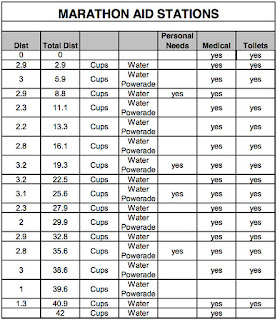Marathon Intake
Like every other aspect of my racing I do apply a drinking and carbohydrate strategy during the race. The best way to describe this is cover what I actually did during the race and give some reasoning along the way.
The carbohydrate loading leading was covered in Carbohydrate Loading - Melbourne Marathon.
Pre-race:
2.5 hours prior to race start:
- 60g cornflakes
- 150g peaches & pears
- 200ml low-fat milk
- Espresso
- 500ml Gatorade
This topped up my liver glycogen stores that get depleted during the overnight sleep. The timeframe allows everything to settle and pass through my stomach to minimise the risk of gastrointestinal problems during the race. The water within the gatorade combined with the hydration strategy as part of the carbohydrate loading over the previous days should have me adequately hydrated for the race start.
45min prior to race start:
- 300mg caffeine
10min prior to race start:
- 200ml water
Race:
There is always more than one way to take in hydration and nutrition during races. Because there are aid stations approximately every 2-3.2km my goal was to carry minimal nutrition on my person during the race. What I did carry was three PowerGels, tucked into the legs of my knicks. Enough to supplement the gaps out on the course and to provide a bit of backup.
For some reason not every aid station provided Powerade, there were a few that supplied water only. As a result there were three areas that had 5.2, 6.6 and 5.7km without a carbohydrate source available. Not problem, just meant I had to think a little more about what my intake involved at each step, instead of having a set routine every aid station.
What I planned was to take in about 200ml of Powerade at every aid station that offered it, (2 small plastic cups, or 1 larger paper cup), and take in a PowerGel and 200+ ml of water at those stations that had water only. It was also likely that in the following station, that I would take in about 100ml of Powerade and the same of water due to the increase carbohydrate from the gel.
This plan kept the grams of carbohydrate a little high for me. The idea was to allow some front loading of carbohydrate intake during the race. I expected to have small amount of bloating or unsettled stomach in the first half, but nothing that should slow me down. The concept was that if I felt as though gastrointestinal tract was slowing down absorption then I could simply revert to taking in water only, or even skip some intake to allow things to settle. Easier to have the carbohydrate waiting to be absorb, than to have a deficit and try to catch up later in the race when absorption is likely to at its worse.
Execution was almost exactly as outlined above. I consumed my gels at the 8.8, 22.5 and 32.8km points. The latter two were followed by the Powerade/Water split at the following aid station. Between the 25-29km section it was clear my stomach wasn't emptying well as everything just sat and sloshed around. So I took a small amount of water only at the 27.9 and 29.9km aid stations. This worked like it should and all the bloating vanished. I then felt very light and developed a new spring and energy in my running.
With hindsight I still believe I got my nutrition as near optimal as I could. The hitting the from about 38km was a reflection on problems in a lack of conditioning due to the problems in training. A slightly slower pace earlier may have mitigated this a bit, but it is still likely I would have ended up with nearly the same overall time.
As for the numbers, over the 3 hours and 12 minutes I took in about 170g of carbohydrate and 2.5L of water (including the fluid in Powerade). The carbohydrate was about about 65g in the first hour, 60g in the 2nd and beyond that about 45g in the last section. This seems appropriate for my condition on the day. With better fitness with some training for extended periods at race pace I would have better confidence to even out the carbohydrate intake over the course instead of front loading as much.



I did find that the powerade provided during the 10km was much weaker than bottle powerade, I would have been annoyed
ReplyDeleteif this was the same in the marathon.